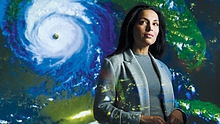Climate Data Scientist Molina Joins UMIACS

Maria J. Molina was five years old when Hurricane Andrew sliced across South Florida and roared over her frightened family’s home. The fierce winds that made it the costliest storm in U.S. history at the time also propelled her toward a career focused on understanding extreme weather.
By her early 20s, she was helping millions do so as a Fox News meteorologist; then, after six years at the network, she traded on-set banter for a deeper dive into the science that fascinated her, resigning in 2016 to pursue doctoral studies.
Fresh off a project scientist position at the National Center for Atmospheric Research, Molina joined the University of Maryland (UMD) last fall as an assistant professor of atmospheric and oceanic science. Her position is funded by UMD’s FAMILE initiative, a $40 million investment to help attract tenure-track faculty from diverse backgrounds. Molina is also an affiliate faculty member in the University of Maryland Institute for Advanced Computer Studies (UMIACS) focused on machine learning.
“My UMIACS appointment will strengthen my relationships and collaborations with other computer scientists, whose expertise on topics like machine learning are greatly valued for climate and weather applications,” she says.
Molina spoke to Maryland Today about her path from “Fox & Friends” personality to data scientist studying Earth’s changing climate with cutting-edge artificial intelligence.
What was Hurricane Andrew like for a small child?
I remember asking, “What’s a hurricane? What’s happening?” and my parents being not quite sure how to answer and seeming scared. That’s terrifying as a kid. That communication aspect stuck with me—I wanted to make sure that people are empowered to make good decisions about safety. From the storm, I remember the noises, windows shattering, and water coming through the door.
What drew you initially to broadcasting instead of research?
My family did not have experience with graduate school. I didn’t know what being a researcher meant. We emigrated from Nicaragua because of civil unrest when I was 1 year old. We would watch meteorologists on the Spanish news, and that was something tangible. I couldn’t imagine myself as a researcher because there was a lack of visible Hispanic women researchers.
What led to your career change?
As a broadcaster, I didn’t have the ability to go deep into questions, like, “Why did this event occur?” Or: “Why was it so difficult to predict correctly?” Or: “Are we going to see more such events in the future?” But after I was working in broadcasting, I could see career opportunities that I couldn’t before.
How do you envision your role as a Hispanic female researcher?
I get really excited to think that I have a career where I can ask these important questions and use the tools of data science—machine learning, neural networks—to think and explore and create knowledge. My identity doesn’t really come into that. But if I get an email—“I saw you talk in my class; it’s refreshing to see a fellow Latina in the position you’re in”—that touches my heart. We must continue to work on representation.
This story was originally published in Maryland Today.
